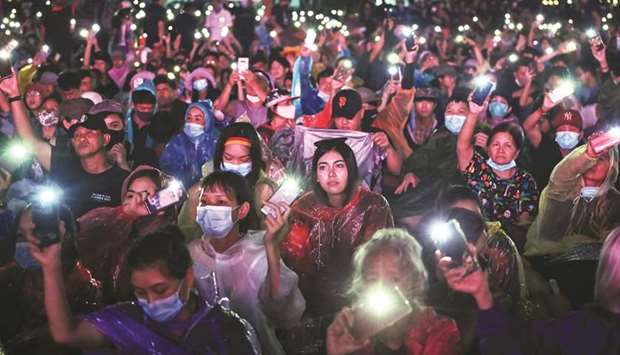Tens of thousands of people joined the biggest protest in years in Thailand yesterday, cheering calls to curb the powers of King Maha Vajiralongkorn’s monarchy as well as for the removal of former coup leader and Prime Minister Prayut Chan-o-cha.
“Unless the monarchy is under the constitution, we will never achieve true democracy,” protest leader and human rights lawyer Arnon Nampa told the crowd gathered within sight of the Grand Palace in central Bangkok.
“More, more,” the crowd chanted after Arnon called for cuts to the royal budget and changes to the constitution to bring the king clearly under its control.
The Royal Palace was not available for comment on the protest and the demands for reform.
Arnon said protesters would today declare “the country belongs to the people not the monarchy” and place a commemorative brass plaque, echoing the words of the leaders of the 1932 revolution that ended absolute monarchy.
Protests that have been building in the southeast Asian country since mid-July have broken a long-standing taboo by criticising the monarchy as well as seeking a new constitution and elections. “People can protest but they should do that peacefully and within the law,” said government spokesman Anucha Burapachaisri.
Thai authorities have said criticising the monarchy is unacceptable in a country where the king is constitutionally “enthroned in a position of revered worship”. Lese majeste laws mean those insulting the monarchy can be jailed.
“Down with feudalism, long live the people,” was one of the crowd’s chants.
Reuters reporters estimated there were at least 30,000 people in the latest demonstration.
Organisers said there were more than 50,000, while police said there were 18,000, still enough to make it the biggest since Prayut took power in a 2014 coup.
Protesters have said they plan to stay overnight and march to Government House today morning. The king was not in Thailand and has spent much of his time in Europe since taking the throne from his late father in 2016.
Sept 19 is the anniversary of the coup against the populist then-prime minister Thaksin Shinawatra in 2006. Among the protesters were many of his red shirt followers, veterans of clashes a decade ago with pro-establishment yellow shirts.
“I’m here to fight for the future of my children and grandchildren.
I hope that by the time I die, they will become free,” said 68-year-old Tasawan Suebthai, a redshirt with amulets round her neck which she hoped would ward off bullets.
So far the latest protests have been peaceful.
The military, which proclaims itself the defender of the monarchy and national stability, has carried out several bloody crackdowns on protesters since the end of absolute monarchy as well as 13 successful coups.
Prayut has said the government would allow protests but that demands for reform of the monarchy were not acceptable.
Arnon is among more than a dozen protest leaders who have been arrested and released on bail over the recent protests, but none has been charged under the lese majeste laws which protesters want scrapped. They also seek to reduce the king’s constitutional powers and his control over the palace fortune and units of the army.
The last time such a large crowd assembled at Sanam Luang was in mourning for the late King Bhumibol Adulyadej, who was widely revered in the country of 70mn.
There were also sympathy protests in Taipei, Tokyo, London, Stockholm and Olso, with others planned elsewhere.

Anti-government protesters hold their mobile phones aloft as they take part in a pro-democracy rally in Bangkok, yesterday.
